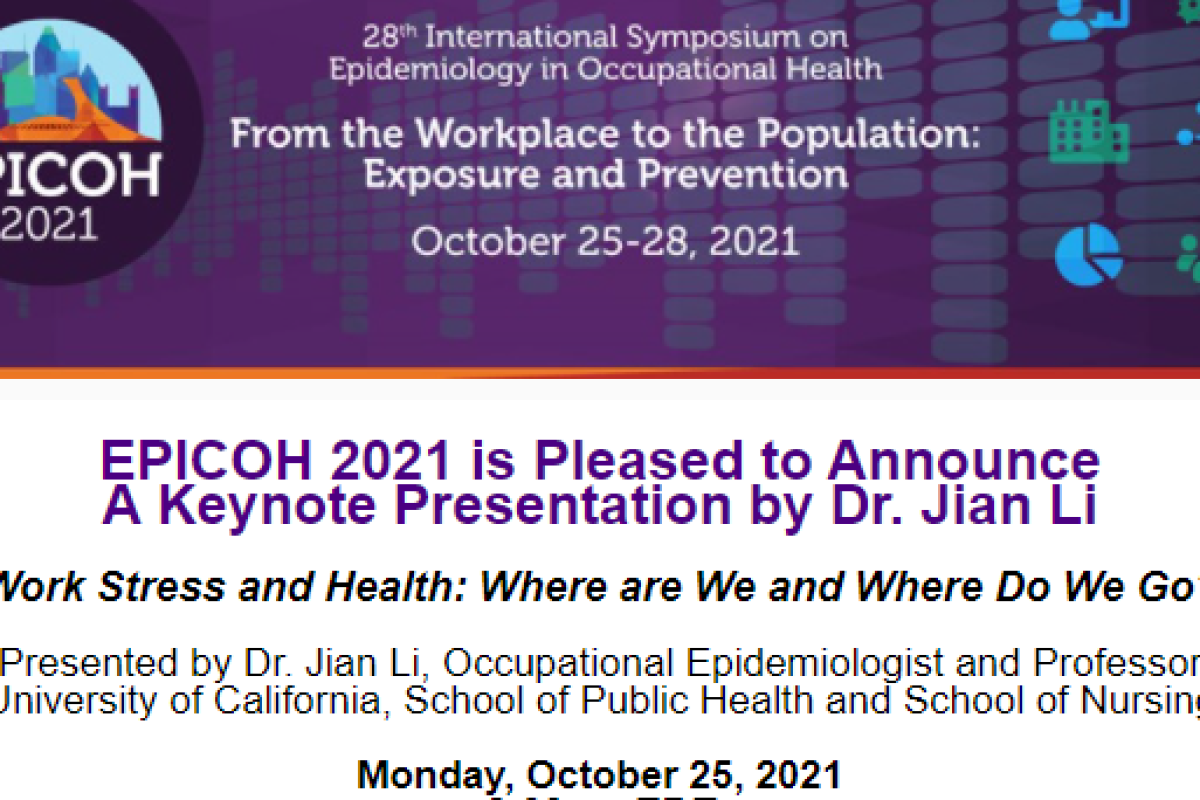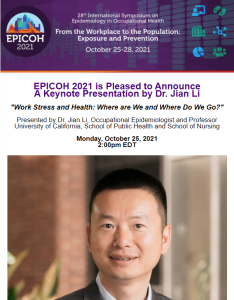|
CARB will be holding a research seminar on how ambient air pollution is related to COVID-19 illness, including infection, disease progression, and deaths. This seminar will cover results from two studies – one looking statewide and one focused on a Southern California cohort.
The statewide study examined risks of COVID-19 infections and deaths associated with PM2.5 exposure. The study used PM2.5 exposure data at the census block group-level, matched to statewide COVID-19 data. The results indicate that PM2.5 pollution is associated with significant increases in risk for COVID-19 infections and deaths.
The Southern California study used individual level data to estimate whether air pollution exposures led to worse COVID-19 outcomes. The results show significant increases in COVID-19 deaths in relation to PM2.5 and other pollutants. Moreover, PM2.5 exposure was found to have a significant effect on the severity of illness. The Southern California study also evaluated the relationship between PM2.5 and COVID-19 mortality risk by race/ethnicity and found differences in risk among racial/ethnic groups.
These studies provide a deeper understanding of the relationship between air pollution and COVID-19 infections and death. They inform CARB’s future health analyses and provide important information on the critical role of air quality standards in protecting public health.
Date: Thursday, July 14, 2022
Time: 9:00 a.m. – 12:00 p.m.
Location: Webinar
Background/Summary
The COVID-19 pandemic represents one of the largest threats to population health in more than a century. A number of studies in the U.S. and globally have found a link between ambient air pollution and COVID-19 outcomes. The U.S. has the most reported COVID-19 infections and deaths in the world, and California has the most infections and deaths of any state in the U.S. In some areas of California there are counties with the highest levels of air pollution in the U.S. Therefore, it is important for Californians to understand the impact of air pollution on COVID-19 health outcomes. In particular, it is critical to understand the risks and impacts of COVID-19 with air pollution exposure for low-income communities and communities of color who have been disproportionately impacted by air pollution.
CARB contracted two research projects- a statewide study and a Southern California study. The statewide study used an ecological design to examine risks of COVID-19 infections and deaths associated with specific increments of PM2.5 exposure at the census block group-level. The study also reviewed PM2.5 exposure data compared to COVID-19 incidence data to find out whether highly impacted communities were more likely to have higher percentages of COVID-19 infections and deaths.
The Southern California study examined whether air pollution exposures led to worse outcomes in COVID-19 cases using sophisticated exposure estimates for multiple pollutants and more detailed information on individual-level data from the Kaiser Permanente Southern California healthcare system. The study also looked at the effect of PM2.5 on the risk of death from COVID-19 by race/ethnicity and looked at PM2.5 risks on the progression of the illness.
The results of both studies provide a better understanding of the increased risks posed by higher air pollution exposure, PM2.5 in particular, on COVID-19 infections, deaths, and the progression of the illness.
Biography
The principal investigator for the statewide study, Peggy Reynolds, PhD, is a Professor in the Department of Epidemiology and Biostatistics, School of Medicine, University of California, San Francisco. Dr. Reynolds is an epidemiologist with research interests focused on environmental risk factors for cancer. Her research program has incorporated geographic information system tools and studies of biomarkers of exposure and effect to assess risk relationships for children and adults. She has a history of community-based participatory research partnerships to examine a number of factors of public concern for cancer and other diseases in women.
The principal investigator for the Sothern California study, Michael Jerrett, PhD, is a Professor in the Department of Environmental Health Sciences, School of Public Health, University of California, Los Angeles. Dr. Michael Jerrett is an internationally recognized expert in Geographic Information Science for Exposure Assessment and Spatial Epidemiology. For the past 22 years, Dr. Jerrett has researched how to characterize population exposures to air pollution and built environmental variables, how to understand the social distribution of these exposures among different groups, and how to assess the health effects from environmental exposures. Over the last decade, Dr. Jerrett has also studied the contribution of the built and natural environment to physical activity, obesity, and several health outcomes.
|






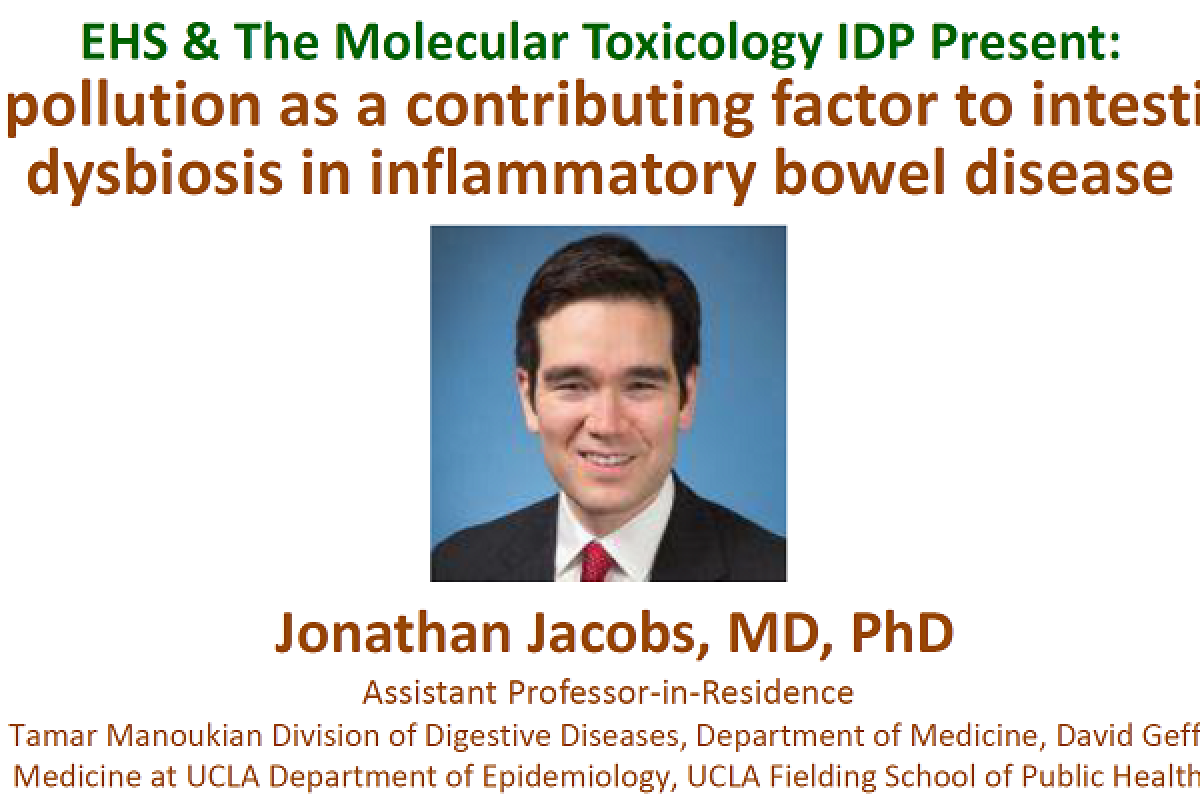
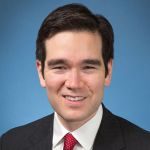 Dr. Jacobs is a gastroenterologist and scientist studying the role of intestinal microbes in inflammatory bowel disease (IBD) and other disorders. He graduated magna cum laude with highest honors from Harvard University in 2003 with an AB in biochemistry. He subsequently received his MD from Harvard Medical School in 2008, graduating magna cum laude in a special field. During college and medical school, he performed research on mechanisms of antibody-mediated arthritis in the laboratory of Diane Mathis and Christophe Benoist with funding from the Howard Hughes Medical Institute. He completed internal medicine residency at Stanford University in 2010 then joined UCLA to pursue gastroenterology training in the Specialty Training and Advanced Research program. He was awarded a PhD in Cellular and Molecular Pathology in 2015 for his research on the IBD microbiome under the mentorship of Jonathan Braun and afterwards joined the UCLA Division of Digestive Diseases faculty. He co-founded the UCLA Microbiome Center and now directs the UCLA Microbiome Core, which provides a comprehensive suite of microbiome-related services to support microbiome research by the UCLA scientific community.
Dr. Jacobs is a gastroenterologist and scientist studying the role of intestinal microbes in inflammatory bowel disease (IBD) and other disorders. He graduated magna cum laude with highest honors from Harvard University in 2003 with an AB in biochemistry. He subsequently received his MD from Harvard Medical School in 2008, graduating magna cum laude in a special field. During college and medical school, he performed research on mechanisms of antibody-mediated arthritis in the laboratory of Diane Mathis and Christophe Benoist with funding from the Howard Hughes Medical Institute. He completed internal medicine residency at Stanford University in 2010 then joined UCLA to pursue gastroenterology training in the Specialty Training and Advanced Research program. He was awarded a PhD in Cellular and Molecular Pathology in 2015 for his research on the IBD microbiome under the mentorship of Jonathan Braun and afterwards joined the UCLA Division of Digestive Diseases faculty. He co-founded the UCLA Microbiome Center and now directs the UCLA Microbiome Core, which provides a comprehensive suite of microbiome-related services to support microbiome research by the UCLA scientific community.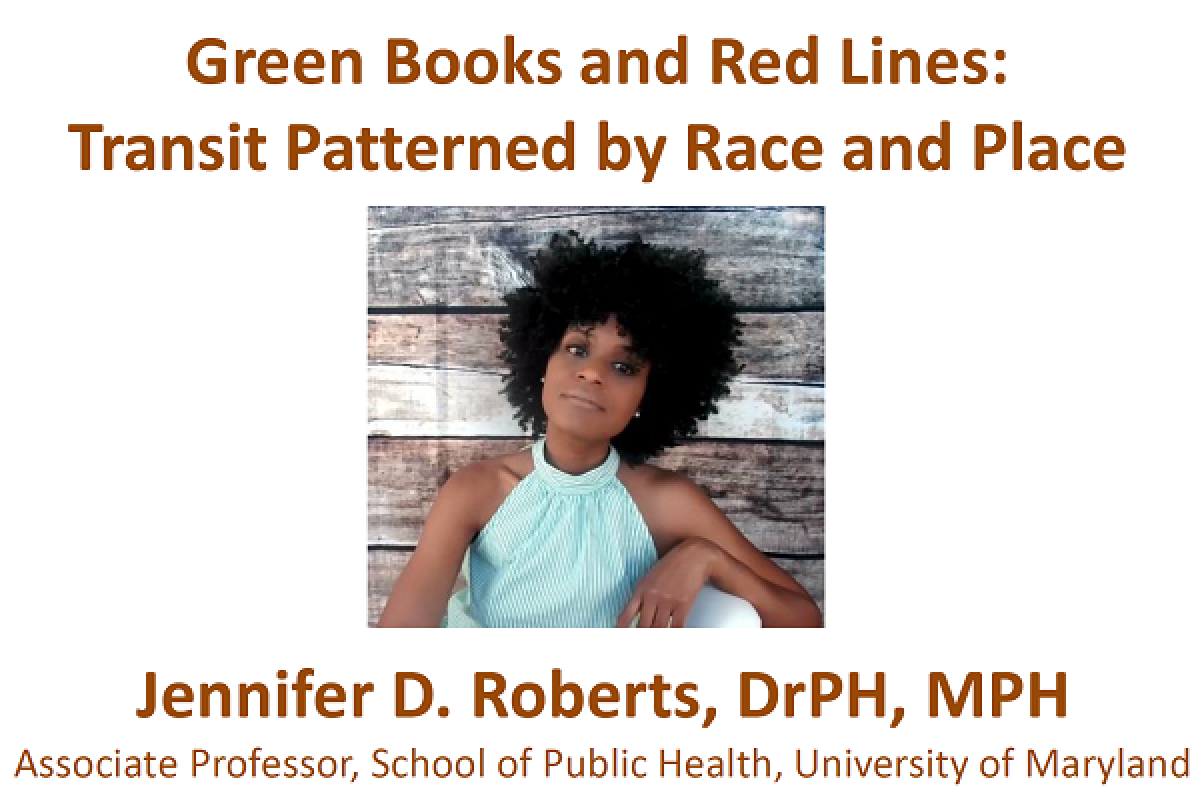
 Jennifer D. Roberts is a tenured Associate Professor in the Department of Kinesiology, School of Public Health at the University of Maryland College Park (UMD). Dr. Roberts is also the Founder and Director of the Public Health Outcomes and Effects of the Built Environment (PHOEBE) Laboratory as well as the Co-Founder and Co-Director of NatureRx@UMD, an initiative that emphasizes the natural environmental benefits interspersed throughout and around the UMD campus. Her scholarship focuses on the impact of built, social, and natural environments, including the institutional and structural inequities of these environments, on the public health outcomes of marginalized communities. More specifically, much of her research has explored the dynamic relationship between environmental, social, and cultural determinants of physical activity and using empirical evidence of this relationship to infer complex health outcome patterns and disparities as well as instigate a powerful shift that recognizes, breaks, and transforms these conditions and determinants of health.
Jennifer D. Roberts is a tenured Associate Professor in the Department of Kinesiology, School of Public Health at the University of Maryland College Park (UMD). Dr. Roberts is also the Founder and Director of the Public Health Outcomes and Effects of the Built Environment (PHOEBE) Laboratory as well as the Co-Founder and Co-Director of NatureRx@UMD, an initiative that emphasizes the natural environmental benefits interspersed throughout and around the UMD campus. Her scholarship focuses on the impact of built, social, and natural environments, including the institutional and structural inequities of these environments, on the public health outcomes of marginalized communities. More specifically, much of her research has explored the dynamic relationship between environmental, social, and cultural determinants of physical activity and using empirical evidence of this relationship to infer complex health outcome patterns and disparities as well as instigate a powerful shift that recognizes, breaks, and transforms these conditions and determinants of health.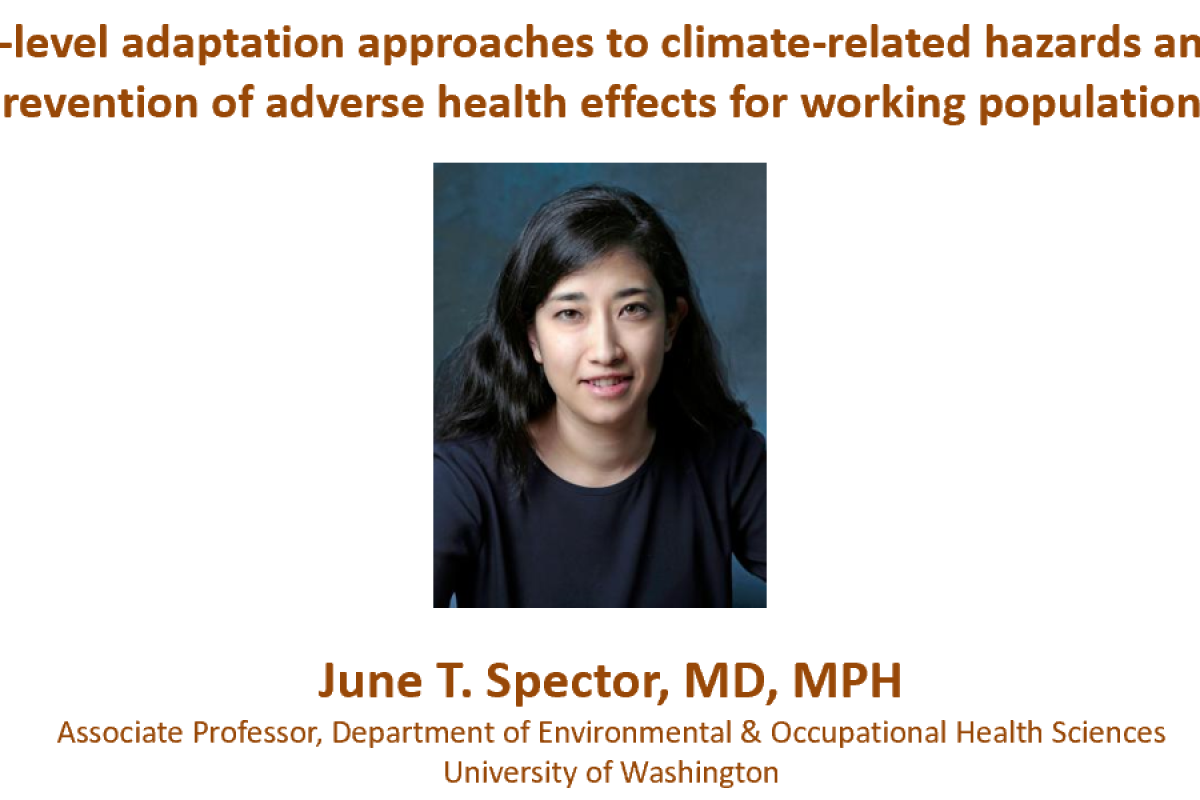
 Heat waves are projected to increase in frequency and severity with climate change. Outdoor working populations are at risk of adverse health effects from heat. Comprehensively approaching prevention can be challenging, as risk factors occur at multiple levels, from land use to community, workplace, interpersonal, and individual factors, and on different time scales. In this talk, Dr. Spector will offer a multi-level framework of adaptation to heat for outdoor workers. She will present examples from epidemiologic, field experimental, and modelling studies in the Western United States and Indonesia to stimulate discussion of promising approaches to prevent adverse health effects from heat for working populations.
Heat waves are projected to increase in frequency and severity with climate change. Outdoor working populations are at risk of adverse health effects from heat. Comprehensively approaching prevention can be challenging, as risk factors occur at multiple levels, from land use to community, workplace, interpersonal, and individual factors, and on different time scales. In this talk, Dr. Spector will offer a multi-level framework of adaptation to heat for outdoor workers. She will present examples from epidemiologic, field experimental, and modelling studies in the Western United States and Indonesia to stimulate discussion of promising approaches to prevent adverse health effects from heat for working populations.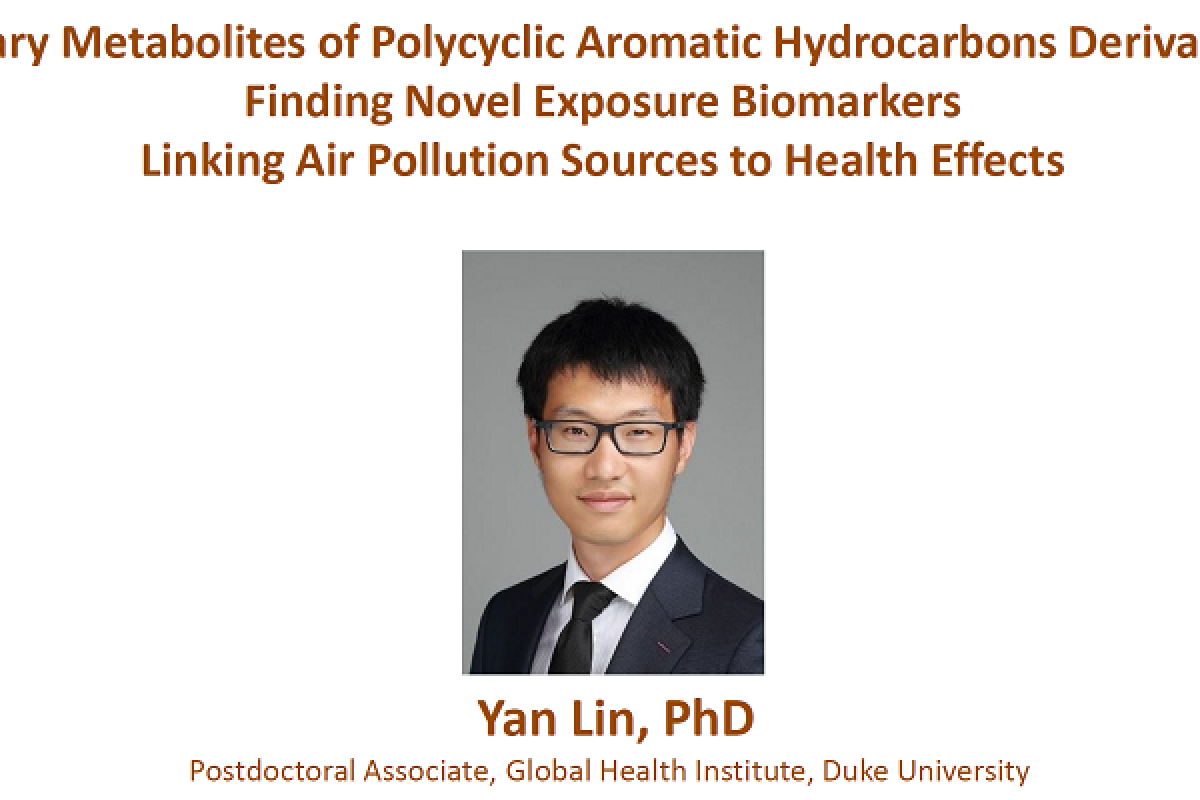

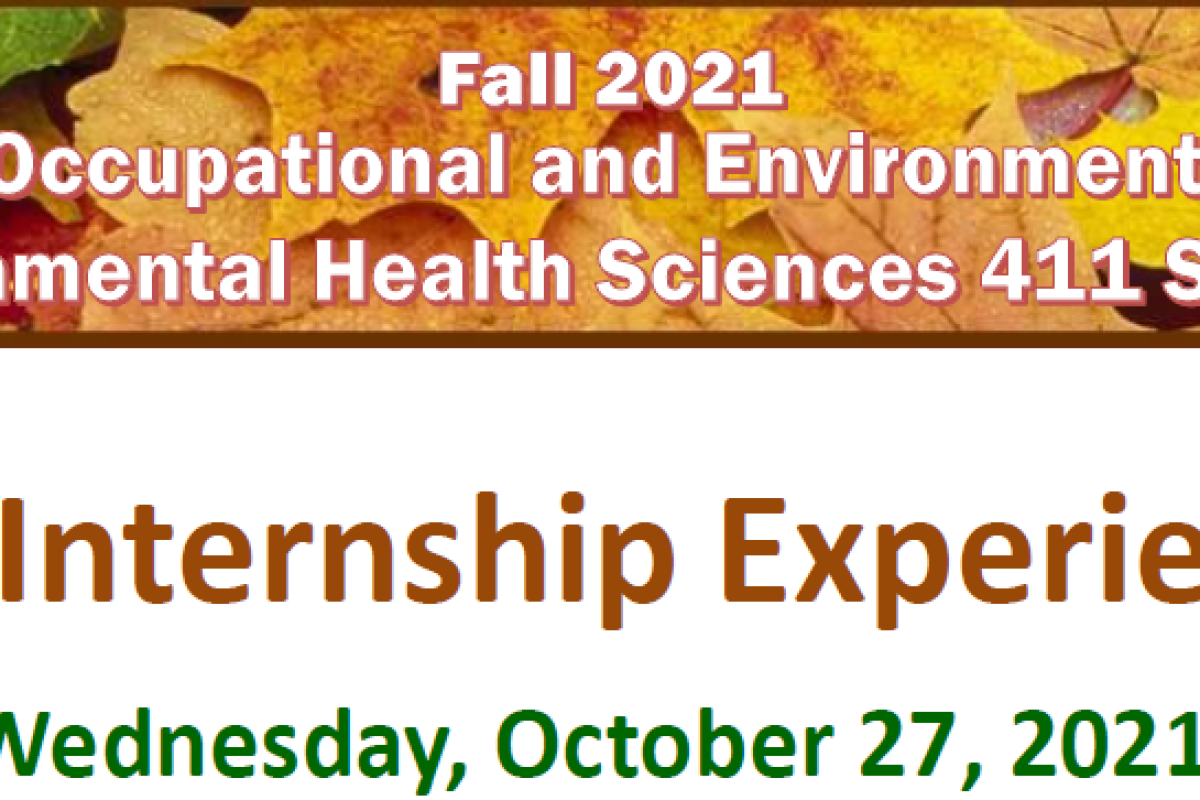
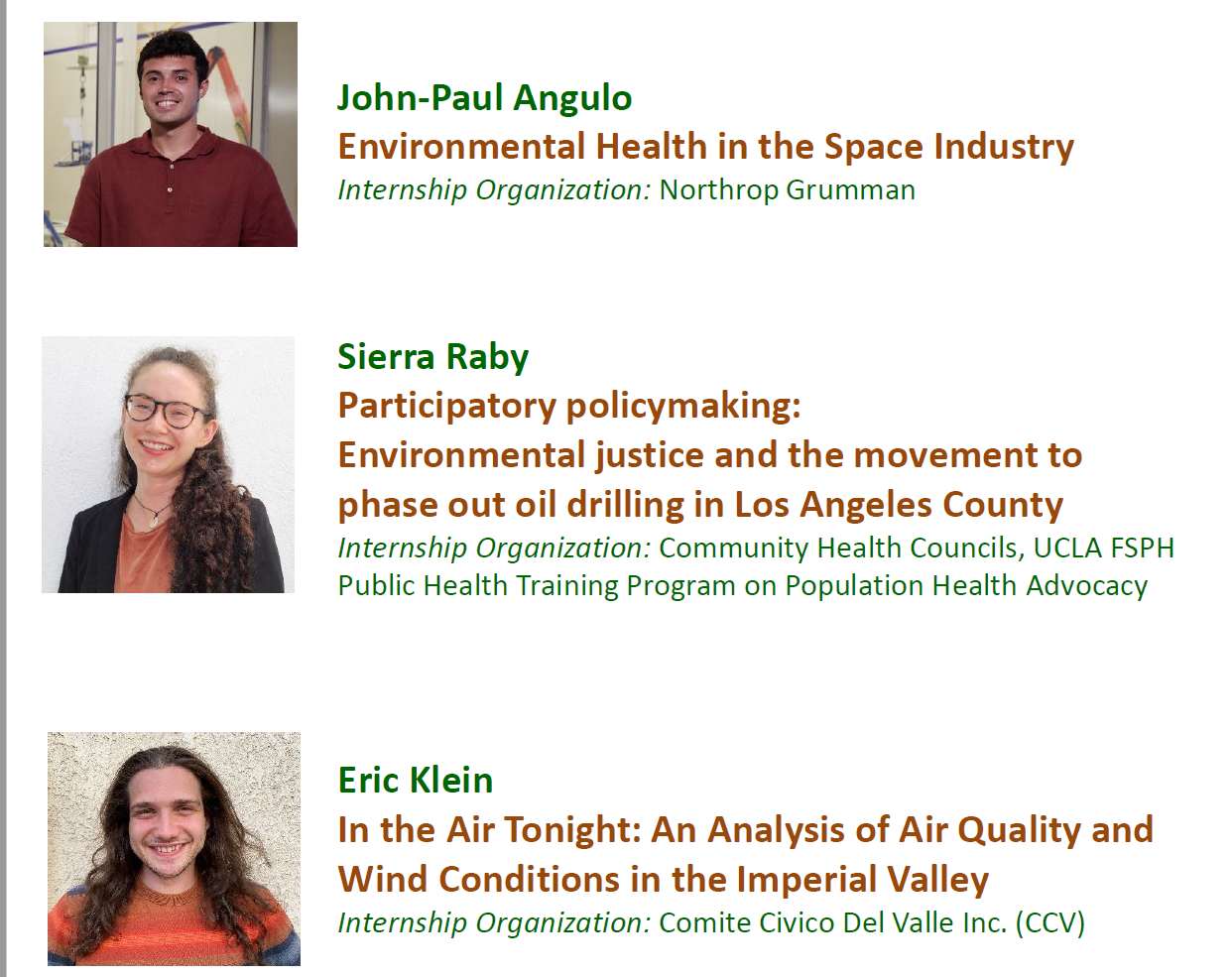
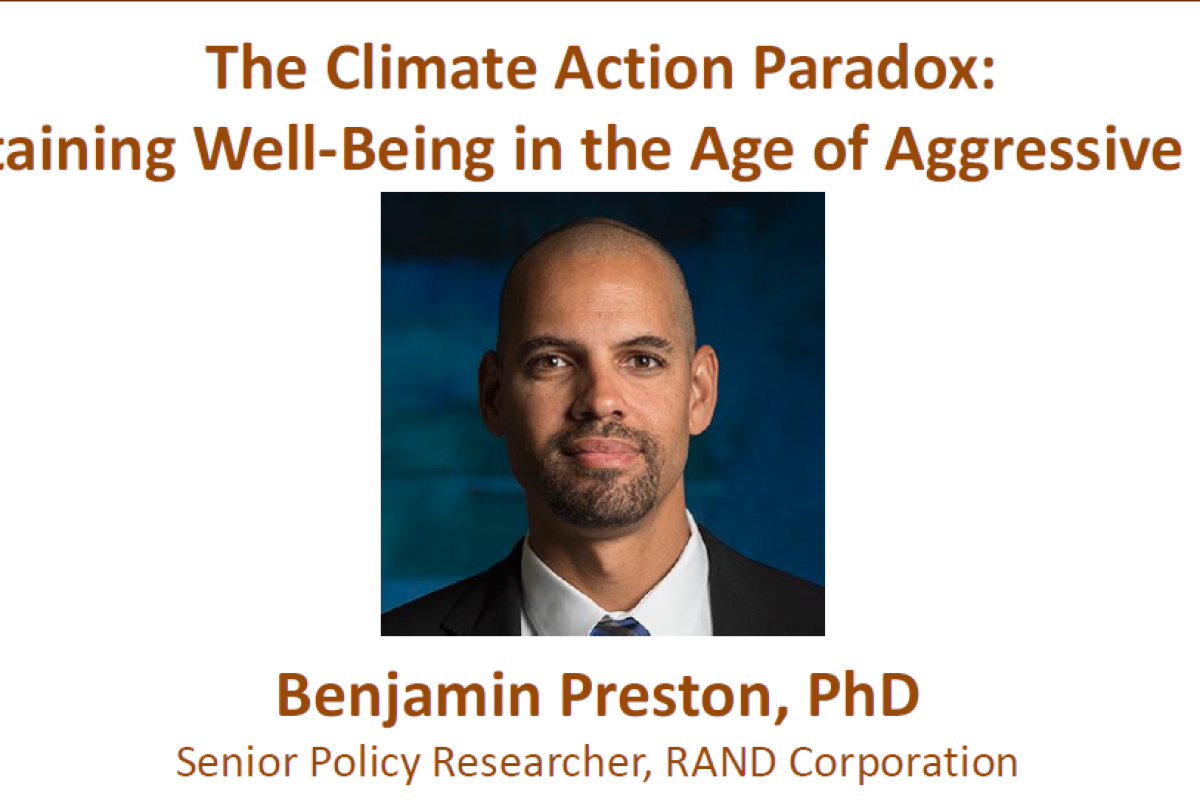
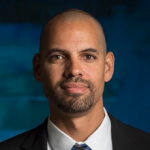 Benjamin Preston (he/his) is a senior policy researcher at the RAND Corporation where he is also director of the Community Health and Environmental Policy program and a professor in the Pardee RAND Graduate School. His recent research efforts include understanding the role of knowledge in climate risk management, analysis of disaster recovery options and their implementation in Puerto Rico and the U.S. Virgin Islands, scenario analysis for a low-carbon future, and the implications shocks such as COVID-19 and climate change for the delivery of infrastructure services. Previously, he held research positions with the Climate Change Science Institute at Oak Ridge National Laboratory, the CSIRO’s Division of Marine and Atmospheric Research, and the Pew Center on Global Climate Change. Preston has held leadership roles on national and international scientific assessments including the fourth and fifth U.S. National Climate Assessments and the Intergovernmental Panel on Climate Change’s Fifth and Sixth Assessment Reports. He received a B.S. in biology from the College of William & Mary and a Ph.D. in environmental biology from the Georgia Institute of Technology.
Benjamin Preston (he/his) is a senior policy researcher at the RAND Corporation where he is also director of the Community Health and Environmental Policy program and a professor in the Pardee RAND Graduate School. His recent research efforts include understanding the role of knowledge in climate risk management, analysis of disaster recovery options and their implementation in Puerto Rico and the U.S. Virgin Islands, scenario analysis for a low-carbon future, and the implications shocks such as COVID-19 and climate change for the delivery of infrastructure services. Previously, he held research positions with the Climate Change Science Institute at Oak Ridge National Laboratory, the CSIRO’s Division of Marine and Atmospheric Research, and the Pew Center on Global Climate Change. Preston has held leadership roles on national and international scientific assessments including the fourth and fifth U.S. National Climate Assessments and the Intergovernmental Panel on Climate Change’s Fifth and Sixth Assessment Reports. He received a B.S. in biology from the College of William & Mary and a Ph.D. in environmental biology from the Georgia Institute of Technology.